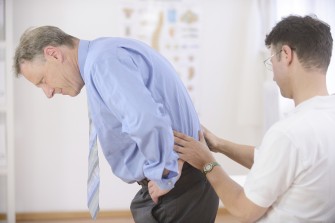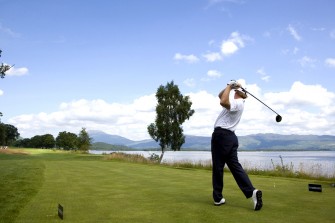Often perceived as a leisurely pursuit, playing golf can be as demanding on the muscular and skeletal systems as much as any other sporting activities.
A common site of injury for golfers is the shoulder, usually the lead shoulder although occasionally involving the left-shoulder in the right-hand dominant player (and vice versa for a left-handed player).
Common injuries affecting a golfer’s shoulder include:
- Subacromial impingement syndrome (‘squishing’ of an inflamed tendon on taking the arm out to the side).
- Acromioclavicular arthrosis (degenerative changes in the joint between the end of the collar bone and the shoulder).
- Rotator cuff tears (tears in the tendons of the muscles that control shoulder movement).
- Glenohumeral instability (lack of stability in the shoulder joint).
- Glenohumeral arthrosis (degenerative changes within the shoulder joint).
Although the majority of people with any of these problems will respond well to non-surgical treatment, including rest and a structured program of physical therapy (such as osteopathy and physiotherapy), further benefits can also be achieved with subtle modifications of the golf swing itself.
The repetative movement involved in the sport can often lead to a soft tissue injury. Over-used muscles can lead to:
- Development of acute painful conditions (pulls, tears, etc).
- Accumulation of small tears (micro-trauma).
- Tissue hypoxia (reduced levels of oxygen).
All of the above factors can result in the tissues producing a tough, fibrous scar tissue in affected areas. This can be particularly noticeable in the shoulder area (but not exclusive to this area, and can affect other areas including the lower back).
The fibrous scar tissue binds up and ties down tissues that need to move freely and unhindered. The muscles can become shorter due to the formation of scar tissue, as well as weaker. Tendons may become tight (leading to tendonitis) and even nerves may become trapped. Such problems can result in a reduced range of motion, reduced strength and pain. Unfortunately, as a golfer, the power of your swing could be sapped.
Treatment Options

The Lloyd’s Wellbeing Centre practitioners can help with all shoulder related issues – whether you play golf or not.
The good news is that professional help from an osteopath or physiotherapist can help with these problems. At the Lloyd’s Wellbeing Centre our team of osteopaths and phyiotherapists have many combined years of knowledge and hands-on experience of treating golfers and general shoulder injuries.
The biomechanics (the science concerned with the internal & external forces acting on the human body and the effects produced by these) of the shoulder girdle is complicated. The clinicians at Lloyd’s Wellbeing Centre have a thorough understanding of the biomechanics involved in a golfer’s swing. This is essential for making an accurate assessment and diagnosis of associated shoulder problems, thus allowing an appropriate treatment plan to be formulated in order to manage the symptoms.
If you are currently suffering from shoulder related issues – whether you play golf or not – then call in at the Wellbeing Centre for advice.








